Is there a difference between casino and sports betting — it’s a question many new and even experienced players ask. Both offer thrills and the chance to win, but they differ in mechanics, mindset, and risk. In this article, we explore what sets them apart and how to choose the right format for you.
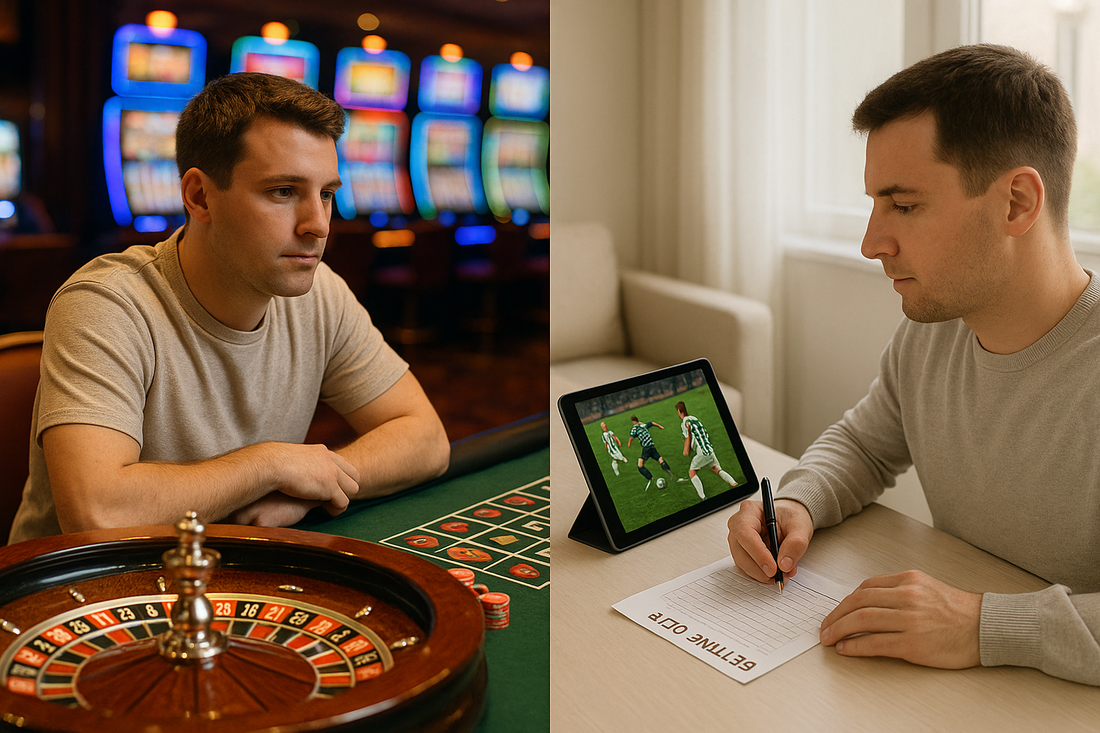
Two worlds of gambling entertainment
Gambling is a universal feeling — one that resonates with almost everyone. Some seek intense emotion, others simply want to switch off, and some hope for a real win. Casino gaming and sports betting are two popular formats where this feeling becomes the foundation of the entire experience. On the surface, they look alike: in both cases, the player places a bet, feels a thrill, and waits for the outcome. But if you look deeper, it becomes clear — these are two fundamentally different approaches to gaming, decision-making, and risk interaction. The contrast begins with how each format is structured and extends all the way to the player’s motivation.
What casinos and sports betting have in common
At the core of both formats lies one key concept: playing for money with an unpredictable outcome. Every participant accepts the risk of losing for the chance to gain. This moment — placing a bet with potential profit — is what fuels gambling behavior.
Beyond the financial aspect, both types of games evoke similar emotions: anticipation, adrenaline, a sense of control (even if illusory), and, in case of success, the satisfaction of winning. This emotional overlap makes the two formats feel similar, especially to newcomers who haven’t explored their differences in depth.
Why they are fundamentally different in mechanics and perception
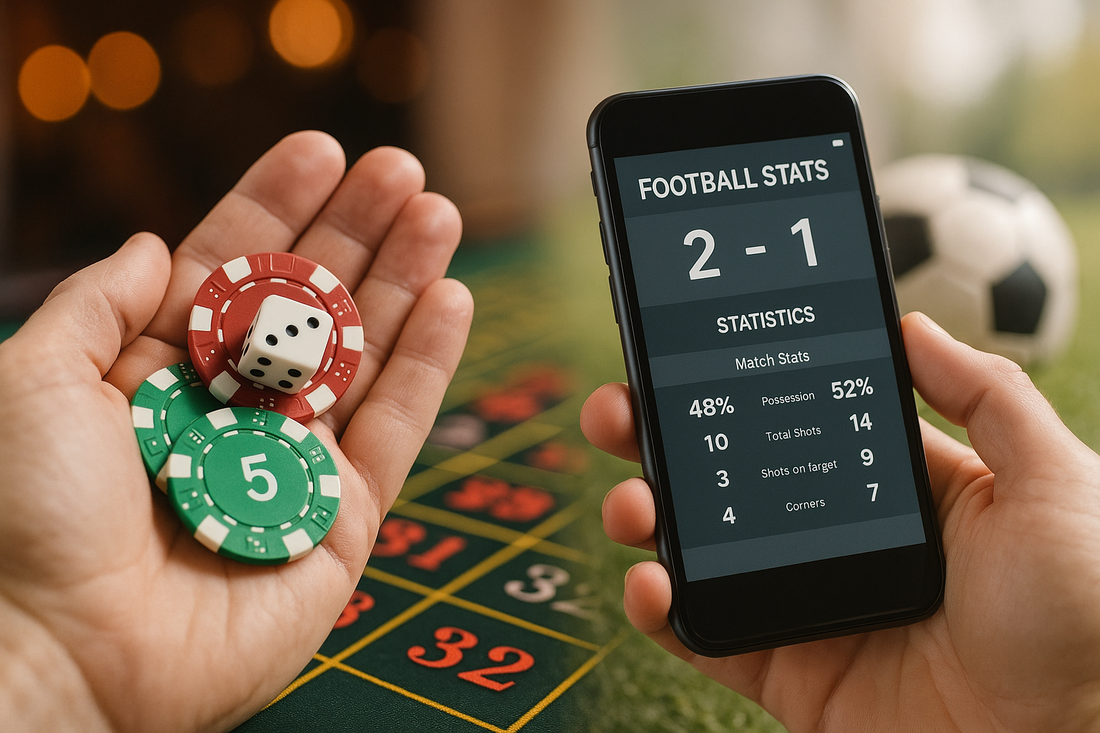
The main distinction between casinos and sports betting lies in the nature of the outcome and the role of the player in the process.
In a casino, everything operates within a closed system. Outcomes are determined by random number generators (RNG) or fixed probabilities. The player competes against the house, not other participants. There’s no real way to influence the outcome — whether it’s a roulette spin, slot pull, or card deal, everything is embedded in the rules, and the house always has the edge.
In sports betting, the result depends on an external, real-world event. The player places a prediction on a match, fight, or race, and competes more with public opinion (and the bookmaker’s line) than the platform itself. This creates the feeling that knowledge matters — that you can analyze teams, consider statistics, and make well-reasoned decisions.
In short, a casino is a self-contained game world with pre-programmed outcomes, while sports betting is an attempt to understand and predict real-life events. That fundamental difference shapes everything else — from how deeply a player gets involved to how they perceive and manage risk.
What the player can influence: luck vs. skill
When it comes to how much control a player has, is there a difference between casino and sports betting becomes a key question — and the answer is yes, and it’s fundamental. The two formats rely on different types of decision-making and perception of risk.
Every gambling format involves two key elements: the player’s influence and the role of chance. This balance determines how much the outcome depends on skill, experience, or analysis — and how much is left to luck. In some cases, the player has little to no impact; in others, they can slightly improve their odds. But in neither format is control absolute. Understanding these differences is the foundation of a more mindful approach to gambling.
Player influence in casinos: minimal (Slots), moderate (Blackjack, Poker)
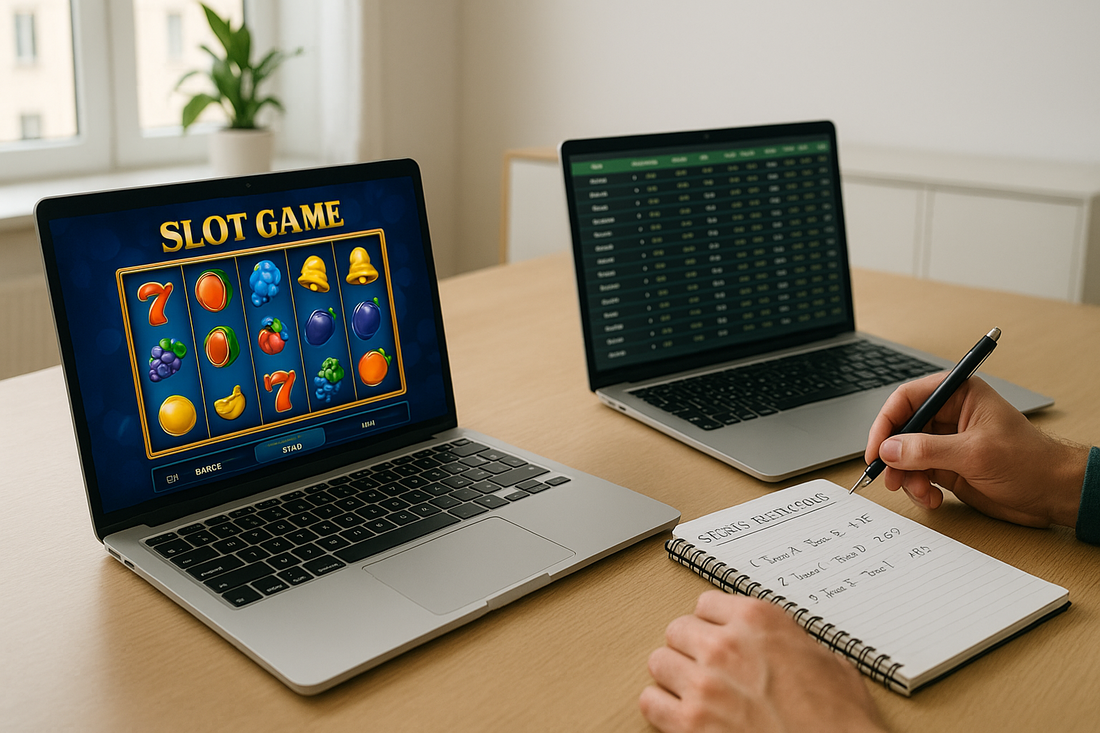
Casino games — especially slots and roulette — are designed so that the player cannot change the outcome through their actions. Everything depends on an algorithm (RNG) or physical randomness. No matter the tactic, each spin or roll is independent and not subject to prediction or influence. In these formats, skill plays almost no role.
That said, there are exceptions — games like blackjack or poker. In blackjack, knowing basic strategy and even card counting (in theory) can offer a small statistical edge. Poker, especially in live or online tournament formats, involves real competition between players. In this case, skill plays a larger role: calculating odds, reading opponents, and controlling emotions all become crucial.
Still, even in these games, luck matters. You can’t control what cards you’re dealt, and even the best player can lose due to a bad run.
Player influence in betting: based on analysis, yet uncertainty remains
In sports betting, the player’s knowledge truly can make a difference — this is a defining feature of the format. Researching stats, team lineups, current form, motivation, even weather — all these can increase the likelihood of making a good prediction. Unlike casinos, outcomes are determined by real-world events, not algorithms.
But analysis doesn’t erase uncertainty. Referee errors, mid-game injuries, poor substitutions, and nerves — all are factors beyond the bettor’s control. Even a perfectly reasoned bet can fail due to one unexpected moment.
So player influence in sports betting can be called conditional: knowledge helps, but it never guarantees success. Betting may feel like a game of informed choices, but it still belongs in the gambling category.
Financial dynamics and risks

The type of game you choose has a direct impact on how you handle your money. Casinos and sports betting not only differ in win probabilities — they also differ in the speed of financial loss, betting patterns, and the player’s perceived control over the situation. To avoid unpleasant outcomes, it’s essential to understand what kind of risks you’re dealing with — and how they actually work.
Speed of losses
Casinos are high-frequency environments. Every slot spin, roulette roll, or card deal takes just seconds. In one evening, a player might place hundreds of bets — each one a new opportunity to win or lose. As a result, money can disappear quickly and almost unnoticed, especially when emotions take over.
Sports betting operates at a different pace. Even the most active bettors physically can’t place wagers at the same speed as casino players. Each bet is preceded by research, then followed by waiting for the event to unfold — a match, fight, or race. This slows down the rate of loss, but doesn’t always make it feel any less painful. The rhythm is slower, but emotional involvement can be deeper.
Type of risk
In casinos, the main risk is the cumulative effect. Even with small individual bets, their high frequency can lead to significant losses. Instant outcomes create a loop of “almost made it,” pushing players toward impulsive and poorly calculated decisions.
Sports betting presents a different kind of risk. Here, players often stake larger amounts — confident in their analysis and preparation. But sports are unpredictable. One unexpected moment — a red card, an injury — and the bet collapses. Losses may happen less often, but they can hit harder, especially after investing time and thought into a seemingly safe prediction.
Player behavior and motivation
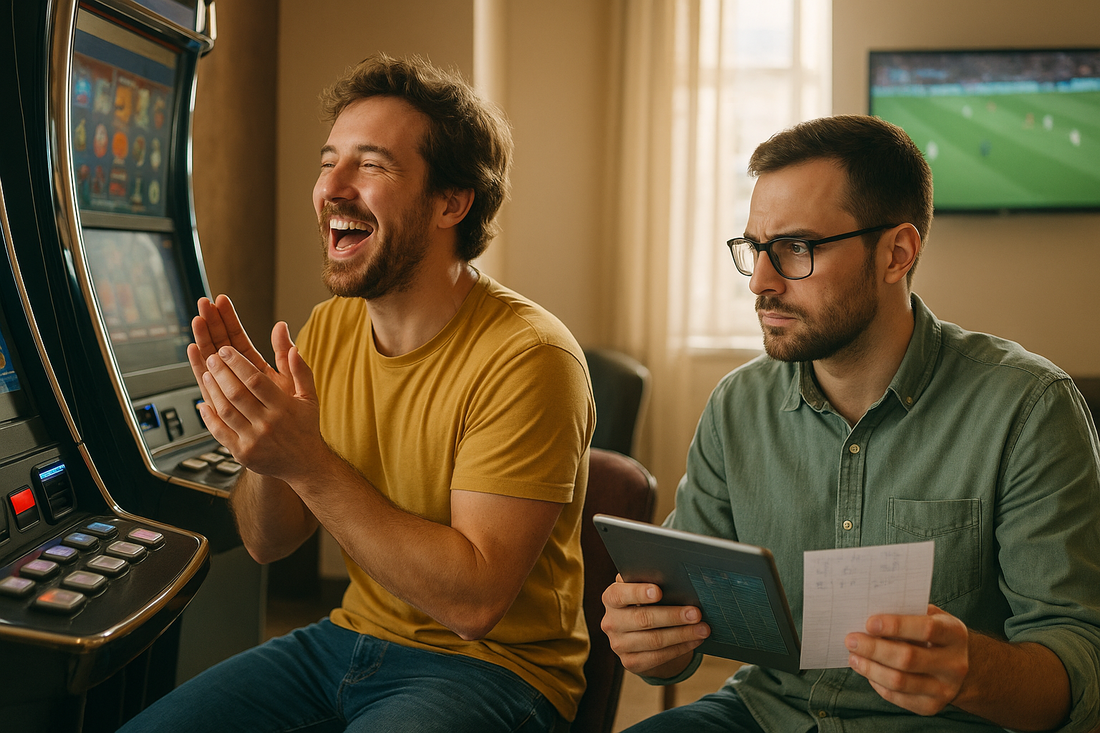
Choosing between casino gaming and sports betting isn’t just about mechanics — it’s also about your internal expectations, personal habits, and goals. People come to gambling for different reasons: some want to relax, others crave excitement, and some believe their knowledge can lead to consistent wins. To figure out which format suits you better, it helps to start with an honest question: Why do you actually play?
Why people play in casinos
Casinos are often seen as a place to chase emotions. Bright lights, constant sounds, instant bets, and quick wins — all of it creates a unique atmosphere where time seems to disappear. For many players, it’s a way to disconnect from everyday life, reduce stress, and test their luck, even if they’re not expecting serious financial gain.
People drawn to casinos are usually looking for immediate gratification: push a button, get a result. This format appeals to those who enjoy a fast pace, prefer not to dive into analytics, and play mainly for the sensation. The motivation here isn’t about control — it’s about chance, surprise, and that fleeting “maybe I’ll win” moment.
Why people place bets
Sports betting attracts a different kind of audience — primarily those who are already interested in the events themselves. For these players, the bet isn’t the whole game; it’s a way to enhance their connection to the match they’re watching. It increases engagement, raises emotional stakes, and gives the sense that knowledge can pay off.
The motivation is usually more rational: belief in analysis, a desire to outthink the bookmaker, a sense of control. Such players often view themselves as more “serious” than casino goers. They think in terms of odds, stats, probabilities, and sometimes profit. While that mindset isn’t always justified, it does reflect a more strategic approach.
Legal and cultural differences
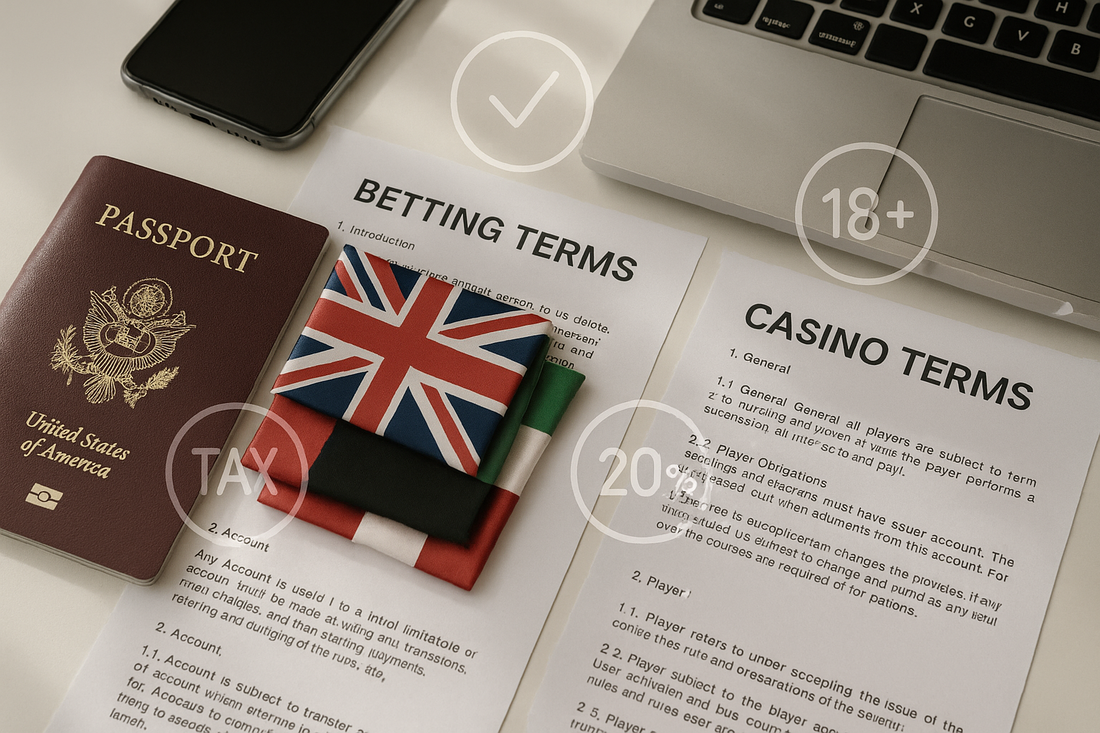
The contrast between casinos and sports betting isn’t just about game mechanics or player motivation — it also shows up in how these formats are regulated and perceived by society. In some countries, both are heavily restricted. In others, they’re considered legitimate — even respected — sectors of the entertainment industry. Depending on cultural, economic, and religious contexts, the rules can vary dramatically.
Where casinos are banned but betting is allowed — and vice versa
In many parts of the world, casinos and betting are governed by different laws. For example, in some Muslim-majority countries, casinos are entirely prohibited due to religious reasons. Yet sports betting — especially on horse racing or football — may be allowed under specific cultural or regulatory frameworks.
On the other hand, there are countries where casinos are legal as part of a tourism-focused economy, while betting is restricted because it involves local sports and is seen as more socially sensitive. There are also jurisdictions where online betting is allowed, but land-based casinos are banned, or vice versa. These distinctions often reflect technological development, tax policies, or historical experience.
The key takeaway: the legality of one format does not imply the legality of the other. Always check current local laws before participating, and don’t rely on assumptions based on general industry reputation.
Why bookmakers are seen as “more serious”
Casinos are often associated with leisure: bright lights, casual play, vacation vibes, and entertainment shows. In popular culture, they’re linked with fun — but also addiction, reckless spending, and luck-based thinking.
Bookmakers, especially in Europe, are seen differently. They’re closely integrated into sports culture: sponsoring teams, appearing in live broadcasts, and aligning themselves with sports analysis. Visually and structurally, betting platforms resemble financial services — more like a trading app than a roulette table. This creates the impression of a smarter, more “calculated” form of entertainment, particularly appealing to younger audiences and sports enthusiasts.
Taxes, restrictions, and licenses
Any legal form of gambling — whether it’s a casino or a bookmaker — is subject to licensing and state regulation. Each country has its own authorities responsible for issuing licenses, setting age limits, and monitoring operators for fairness and safety.
Players should also consider tax obligations. In some countries, gamblers are taxed on their winnings. In others, taxes are handled by the platform, so payouts come “net.” Hybrid models also exist.
Other regulations that may apply include:
- Limits on wager size or payout ceilings
- Mandatory identity verification
- Options for self-exclusion or spending controls
If you’re playing on a foreign platform, take time to understand both the site’s internal rules and your country’s legal environment. This can prevent unpleasant surprises — and make your experience safer overall.
Now that we’ve explored is there a difference between casino and sports betting, the key is choosing the format that suits you best. Think beyond winning odds — consider your personality, mindset, and goals. Try both options in a safe environment and play with intention.
